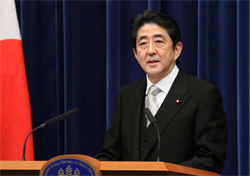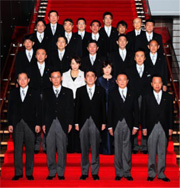Home > Highlighting JAPAN > Highlighting Japan JANUARY 2013 > Inauguration of the Second Abe Cabinet
Highlighting JAPAN
PRIME MINISTER'S DIARY
Inauguration of the Second Abe Cabinet

Prime Minister Shinzo Abe speaks at the press conference on December 26, 2012
Upon the formation of the new Cabinet, Mr. Yoshihide Suga, the new Chief Cabinet Secretary, announced the list of Cabinet members at the Prime Minister's Office.
Later, the investiture ceremony of the Prime Minister and the attestation ceremony of the Ministers of State were held at the Imperial Palace, marking the official inauguration of the Second Abe Cabinet. In the evening, new Prime Minister Shinzo Abe held a press conference.
"In keeping with my determination to defeat the impending crisis for the sake of our nation and people, today I formed a 'crisis breakthrough Cabinet.' In inaugurating this 'crisis breakthrough Cabinet' I have instructed its members to dedicate their greatest possible efforts to the three areas of economic revival, reconstruction, and crisis management."
"The areas stricken by the Great East Japan Earthquake are now in the midst of their second cold winter. Even now, 320,000 people are forced to lead lives of hardship, living evacuated into temporary housing and so on. I recognize the acceleration of reconstruction as being of the greatest importance. I have appointed as Minister for Reconstruction a person who is extremely familiar with the voices of the people in the disaster-stricken areas, and above all those of the people onsite in Fukushima. I will have the Minister for Reconstruction change the mentality of the personnel at the Reconstruction Agency and accelerate reconstruction through a hands-on approach that considers the sensitivities of the people in the disaster areas. With regard to Fukushima in particular, there have been a multitude of issues, including decontamination and livelihood rehabilitation. I will concentrate the capabilities of the various related ministries and agencies, centered on a newly created post of Minister in Charge of Comprehensive Policy Coordination for Revival from the Nuclear Accident at Fukushima, and undertake the revival of Fukushima under the responsibility of the national government, with the national government standing at the forefront."

The Second Abe Cabinet
"Through the collective efforts of the Cabinet, I will generate results by vigorously advancing economic policy under the three prongs of bold monetary policy, flexible public finance policy, and a growth strategy that encourages private sector investment. I will restore a Japanese economy that rewards those who work hard and a Japanese economy in which people can feel keenly that their lives tomorrow will be better than their lives today."
"We must also restore proactive diplomacy that defends our national interests. A great many issues can be found in Japan's relations with China and with the Republic of Korea and also in its relationship with the United States, the relationship that constitutes the foundation of Japan's diplomacy and security. It is necessary to consider strategy from a panoramic perspective of the world map, including the United States, Russia, India, the countries of ASEAN, and others. I will develop in a strategic manner our diplomacy as our comprehensive capabilities. More than anything else, it is imperative that we rebuild the relationship of trust we enjoy under the Japan-U.S. alliance. The other day, I had a telephone conversation with President Obama. At that time, we agreed that we would construct our relationship over the long term. I recognize that the first step in turning Japan's foreign and security policy around is reinforcing our kizuna—our bonds of friendship—once more under the Japan-U.S. alliance, which is the cornerstone of Japanese diplomacy."
© 2009 Cabinet Office, Government of Japan






